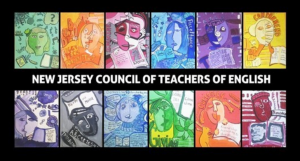
Sessions are FREE for NJCTE members; $5 for everyone else. Register today!


Sessions are FREE for NJCTE members; $5 for everyone else. Register today!
We are proud to share the 2021 issue of New Jersey English Journal (NJEJ). This year’s theme is, “Course Correction: The Adaptive Nature of English Language Arts.”

In this issue, we hoped to create an opportunity for reflection on how the pandemic has changed the course of teaching English Language Arts. In our call for submissions, we asked authors,
This issue features work in three genres: poetry, reflective pieces, and research articles. Our authors include current teachers, teacher educators, and literacy leaders.
One set of articles from teacher educators focused on the importance of preparing pre-service teachers to adapt to quickly changing circumstances (Emily Wender, “Training Adaptive Teachers”) and to be “flexible” (Elizabeth Leer, “Learning to Teach in a Pandemic: Qualities Contributing to Success”).
During a time of great turmoil and danger to our physical selves, several of these articles remind us that it is ok to “let some things go” (Sheila Benson, “Maybe Elsa’s Right: We Need to Let Some Things Go”) and instead, that it is critical to care for our own and our students’ mental health and social/emotional needs. (See, for example, Latasha Holt and Teesha Finkbeiner’s piece, “Uniting in a Reading Education Course to Support Mental Health Awareness During the COVID-19 Pandemic,” Kathleen Adler’s “Reading: The Key to Addressing Students’ Social Emotional Needs in the Time of COVID-19,” and “In Praise of Poetry: Using Poems to Promote Joy, Community, and SEL During the Pandemic” by Jordan Virgil and Katie Gallagher.)
Additionally, many of our pieces offered guidance and reflection on how to use technological tools to foster student connection and engagement during remote teaching, such as Annie Yon’s piece on Padlet, “How Padlet Encouraged Student Collaboration and Engagement in My Virtual Classroom,” and Maria Geiger’s piece on the flipped classroom, “Flip Your Way Into the Future of Learning.”
To read the full 2021 issue and access back issues, visit: https://digitalcommons.montclair.edu/nj-english-journal/